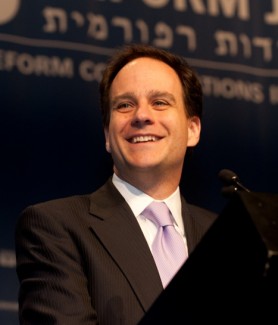 Newsweek’s “Daily Beast” published its list of the Top 50 Influential Rabbis of 2012, and guess who’s on it? That’s right, JOIN’s very own Board Chair, Rabbi Jonah Pesner. We’re thrilled! And the timing couldn’t be better as we prepare to honor Jonah with the Tekiah Social Justice Award at our National Summit on April 29th and 30th.
Newsweek’s “Daily Beast” published its list of the Top 50 Influential Rabbis of 2012, and guess who’s on it? That’s right, JOIN’s very own Board Chair, Rabbi Jonah Pesner. We’re thrilled! And the timing couldn’t be better as we prepare to honor Jonah with the Tekiah Social Justice Award at our National Summit on April 29th and 30th.
Pesner is currently the Senior Vice President of the Union of Reform Judaism (URJ) and founding Director of the URJ’s Just Congregations. He’s led efforts to engage thousands of members of congregations to join together in successful campaigns for health care access, affordable housing, public education, gay and lesbian rights, nursing care workers rights, and living wage.
In a recent interview, Jonah discussed the roots of his organizing work:
As a kid growing up in the 1970s and ‘80s, I had never heard of “organizing” or of Saul Alinsky. But the principles and values of community organizing were very present in my life—particularly in my Jewish community. My parents and my brother were very involved at our small synagogue in Greenwich Village. It was a synagogue that had a soup kitchen in the basement, which at the time, was controversial and quite radical. When I was 14, my father died very suddenly, and my NFTY youth group advisers along with my mentors and friends in the Reform Movement, were the people who nurtured and supported me. My Jewish community inspired me to become a rabbi. In addition, social justice became a defining principle of my life during this difficult time. I participated in the Religious Action Center’s very first experiment in bringing teens to lobby on Capitol Hill. We advocated for social justice, which really shaped how I understood my role in the world as a Jew.
My commute to high school probably had the most profound impact on my decision to become an organizer. Every day for four years, beginning in 1983, I took the New York City subway from a very nice part of Manhattan to the Bronx where I attended The Bronx High School of Science. Near 86th Street on the Upper West Side, I began to notice that the colors of the people on the subway would change. White people would exit, and Black and Hispanic people would enter. By the time we reached 161st Street, I would look out the subway window and see neighborhoods with dilapidated buildings, heaps of trash, street walkers, crack dealers, and tons of broken bottles. I would think to myself, “Who the hell could live in this neighborhood?” So, when people who actually did live in the neighborhood got on the train, I would just look down at my homework. Nobody talked to each other. Everyone was afraid. I began to sense a profound disconnect between the social justice work I was doing with the Reform Movement—a community in which most of my friends lived with relative material comfort and security—and the sobering reality I encountered during my commute to high school every day. I had an appetite to change what I saw. And, only years later, did I realize that organizing was the skill I needed to make this change possible.
Learn more about Jonah’s story and meet Jonah in person at our National Summit. Register for the Summit today.






